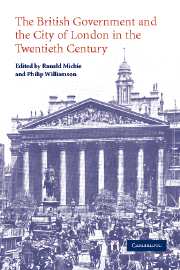Book contents
- Frontmatter
- Contents
- Notes on contributors
- Acknowledgements
- Conventions and abbreviations
- Introduction
- Part I The long perspective
- Part II Markets and society
- Part III Government and political parties
- Part IV The interwar period
- 10 Moral suasion, empire borrowers and the new issue market during the 1920s
- 11 Government–City of London relations under the gold standard 1925–1931
- 12 The City, British policy and the rise of the Third Reich 1931–1937
- Part V 1945–2000
- Select bibliography
- Index
11 - Government–City of London relations under the gold standard 1925–1931
Published online by Cambridge University Press: 04 July 2009
- Frontmatter
- Contents
- Notes on contributors
- Acknowledgements
- Conventions and abbreviations
- Introduction
- Part I The long perspective
- Part II Markets and society
- Part III Government and political parties
- Part IV The interwar period
- 10 Moral suasion, empire borrowers and the new issue market during the 1920s
- 11 Government–City of London relations under the gold standard 1925–1931
- 12 The City, British policy and the rise of the Third Reich 1931–1937
- Part V 1945–2000
- Select bibliography
- Index
Summary
Implicit in the decision to return to the gold standard at the exchange rate of $4.86 in 1925 was the assumption that it would benefit both the City of London and the government. The City would again operate in a currency of unsurpassed prestige, backed by gold and unique among major European currencies in retaining its prewar exchange rate. Holders of sterling and sterling-denominated securities would know that under the gold standard the Bank of England was obliged to exchange sterling for gold at a statutory rate (one standard ounce of gold = 77s 10½d) and to defend the rate through every means available to it, including adjustment of bank rate and other interest rates. The gold standard also promised to constrain politicians from interfering in the monetary and financial system, which under gold would operate according to supposedly automatic rules. In the event that politicians succumbed to the temptation to over-tax or over-spend, the gold standard would bring them up short when their actions reduced the country's international competitiveness, weakened its balance of trade and forced the Bank of England to raise interest rates. In fact, the gold standard had an even broader appeal to the merchants, brokers, insurance underwriters, shipowners, financiers and bankers of the City, which was that, in theory at least, it made redundant other restraints upon trade and finance.
- Type
- Chapter
- Information
- Publisher: Cambridge University PressPrint publication year: 2004
- 4
- Cited by



